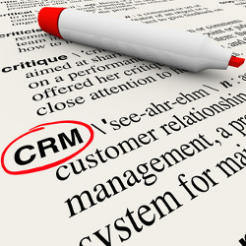CRM software is often touted as a must-have for any charity with a donor base - but this does not mean all charities should take it up, says Richard Cooper.
The benefits of customer relationship management technology have been well publicised and whether you are a business or a charity, the software can be a lifesaver when it comes to keeping track of fundraising or operational activities and outreach with clients or donors. That said, the technology is not for everyone. Many charities abandon CRM projects before the implementation is even complete as they don’t realise the time commitment and investment required to get value from the system.
So before your charity fills out the form for free or hugely discounted software from the Salesforce Foundation or Microsoft Dynamics, ask yourselves the following questions. They will help to determine if you need – and can benefit from - CRM technology:
- Do you have data on donors or clients that you need to share between team members?
- Do you have disparate data on donors or clients in multiple documents, spreadsheets or files?
- Is it easy for team members to get access to data or information from wherever they are, or do they need to physically travel to the office or rely on emails from colleague to view it?
- Do you have all of your information on the services you provide a client in the same place, or are they listed in several databases held by individual service teams?
- Are your funders demanding reports that are difficult to produce in a short timescale?
If you answered ‘no’ to the majority of these questions, you probably do not need CRM and would likely find it to be more of a burden than a benefit for your organisation. You may find formalising your processes to ensure your databases and spreadsheets are kept up-to-date and accessible to the right people are all you need to increase your organisation’s efficiency in dealing with clients and donors.
If you answered ‘yes’ to more than half of these questions, however, your charity may indeed benefit from the use of CRM technology. This brings us to the next step in the process – are you ready for it? This next set of questions will help you determine if your charity is ready to undertake the challenges of implementing CRM:
- Do you understand what you are trying to achieve with a CRM system?
- How bad is your pain? Are you currently losing track of donors, receiving complaints or missing out on donations or funding?
- Do you have a senior executive committed to resolving these problems and who is prepared to drive through a CRM project when it gets tough – as most do?
- Do you have a clear understanding of the processes for collecting and updating your data?
- Can you identify the cost benefits of CRM for your organisation? Will it save you time and increase the accuracy of your client/donor interactions?
- Do you understand the benefits of CRM for the people on the ground actually carrying out the processes/updating the system? Are they greater than the pain that comes with change?
- Do you have the technical resources (or understand the cost of acquiring them) to implement a CRM system?
If you answered ‘yes’ to all of these questions then you are well on your way toward CRM success. If you found yourself floundering or answering ‘no’ to some of the questions, you need to take a hard look at the organisation and weigh out the costs versus the benefits to determine if it’s right for your team.
I realise I’ve taken a bit of a ‘tough love’ approach to CRM, but trust me; I’ve seen charities with the best will in the world fall at the first hurdle. I’m a huge advocate of the technology and know charities, large and small, that couldn’t function without it, but it does require a change in the way of working and buy-in from all levels of the organisation to achieve this level of success. These questions can help ensure you make the right choices about your approach to CRM.
Richard Cooper is director of programmes at the Technology Trust









